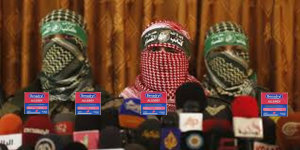No such flexibility in defining permissible combat operations should be afforded Israel, the Council warned.
 Geneva, March 11 – The United Nations Human Rights Council issued an interim directive today to the commission investigating possible war crimes during the Israel-Hamas conflict this past summer, instructing the team to make certain allowances in Hamas’s favor when determining whether the organization’s behavior in combat constituted violations of the Laws of Armed Conflict.
Geneva, March 11 – The United Nations Human Rights Council issued an interim directive today to the commission investigating possible war crimes during the Israel-Hamas conflict this past summer, instructing the team to make certain allowances in Hamas’s favor when determining whether the organization’s behavior in combat constituted violations of the Laws of Armed Conflict.
The Council issued an addendum to its instructions to the commission of inquiry, laying out several considerations that the commission may not have applied in its current investigation and analysis, specifically noting that the requirement under international law to have combatants wear clearly marked uniforms to distinguish them from the civilian population should be disregarded for Hamas, since the latter have complained that some of its fighters might be allergic to the fabric and experience itching.
“The commission will note that this Council views favorably the contention by Palestinian militant leaders that the requirement to clothe combatants in distinct garb places an undue operational burden on Hamas military command,” read the addendum, in part. “The commission is hereby instructed to ignore such would-be violations by Hamas in its report, as it cannot be expected that the organization adhere to the uniforms requirement: overseeing and implementing such a measure from Central Command when Central Command is located in a sub-basement of a civilian hospital is a supremely difficult task.”
Allowances are also to be made regarding the definition of “targeting civilians” where Hamas’s offensive capabilities are concerned, says the addendum. “Because it was known that Israel had deployed its Iron Dome missile defense system in most of the targeted areas, the commission is to view Hamas rocket launches at Israeli territory as aiming at military equipment – namely, the projectiles that ultimately struck many of the incoming rockets. The fact that the Iron Dome system does not choose to intercept one hundred percent of incoming missiles and long-range mortar shells is not Hamas’s concern.” Iron Dome is programmed only to target missiles with a calculated trajectory that takes them to population centers.
No such flexibility in defining permissible combat operations should be afforded Israel, the Council warned. “An evenhanded report, or one that honestly acknowledges Israel’s obligation to defend its citizens, would unduly create expectations of this Council, and of the United Nations as a whole, to fairly and effectively defend actual human rights,” said the statement. “Such obligations are beyond any reasonable set of requirements of a body ill-suited to activities more demanding than grand pronouncements, catered receptions, and chickensh*t peacekeeping operations.”
The commission, originally headed by Canadian professor William Schabas, announced later the same day (Tuesday) that it would delay its release of an official report until June. Observers believe the delay is necessary for two reasons: the departure of Schabas amid evidence of a conflict of interest has prompted a reexamination of the analysis, and, more importantly, the new directives in all likelihood necessitate a thorough reworking of the small portion of the report expected to discuss Hamas violations.




